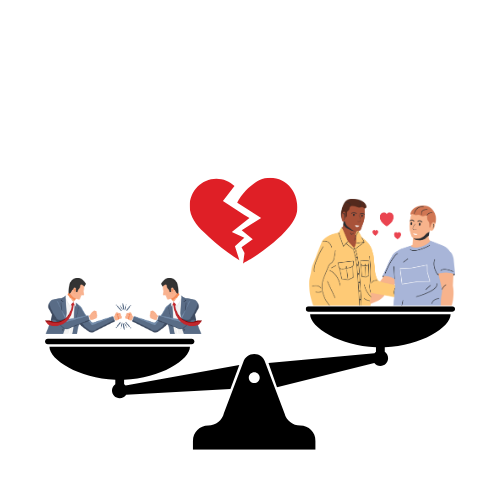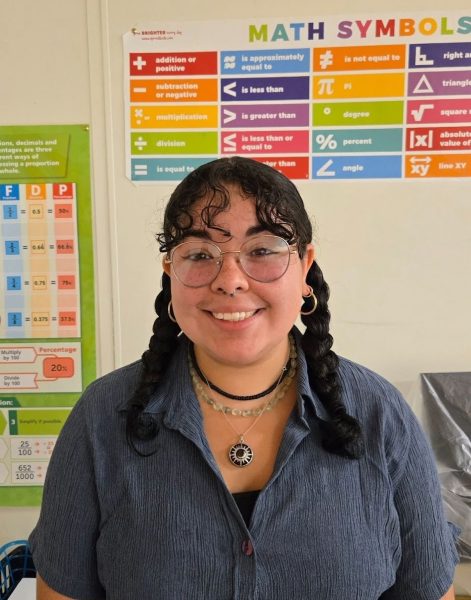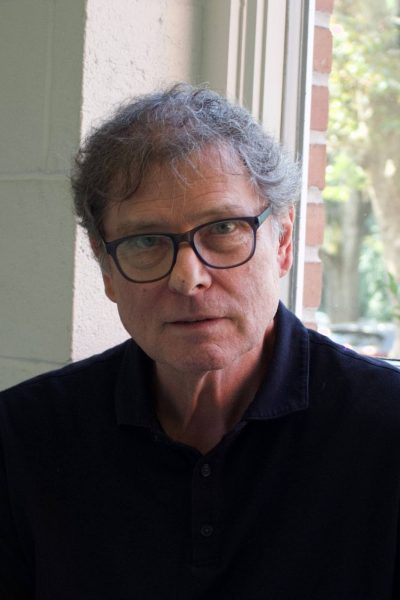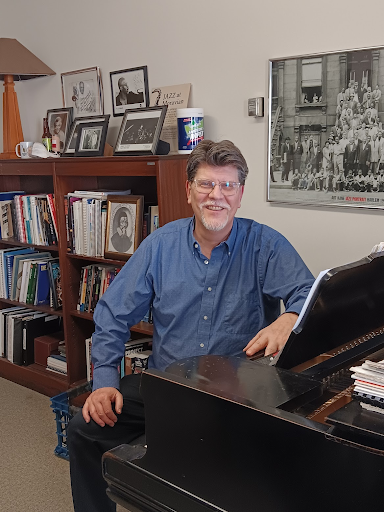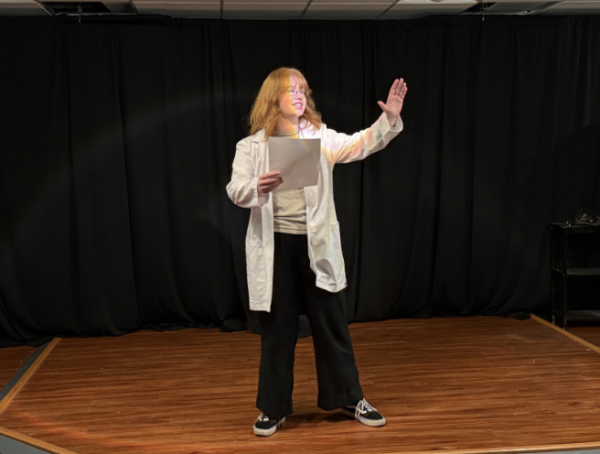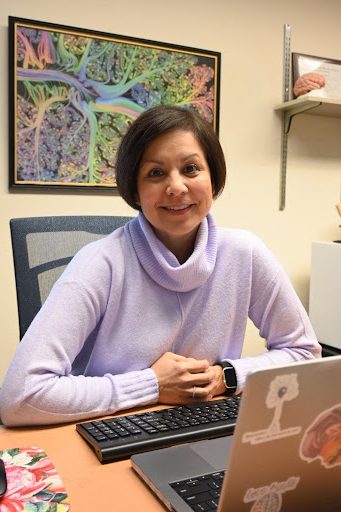Professor Spotlight: Dr. Godfred Fianu

Photo courtesy of Godfred Fianu
Dr. Godfred Fianu is a laboratory coordinator and instructor in the chemistry department at Moravian University. He earned his B.S. in chemistry and math from Principia College (Elsah, IL) and his Ph.D. in chemistry from Lehigh University. Dr. Fianu joined the Moravian community in the Fall of 2017.
What inspired you to go into your field of study?
Chemistry. In high school, it was one of those topics that came naturally to me. I did a lot better with that than other courses, mostly sciences in general. When I got into college, I liked the chemistry department, so I channeled into that particular field. I like the fact that it’s almost like a union between physics and biology, sort of in the middle, and for everything you need to know some of the chemistry behind it. I enjoy just having to navigate through all these avenues of chemistry.
What research are you currently working on?
Right now I am looking at finding environmentally-friendly and safe ways to reduce esters with a titanium-based catalyst. These are things that, if not done right, can get out of hand. It became fortuitous how we discovered that just by using different additives you can change the reactivity of the titanium-based catalyst so it is acting more as a Lewis acid instead of a radical reductant. That was fascinating to me. I discovered that towards the end of my Ph.D. studies and it’s something I wanted to go back to. So when I got the opportunity to do research here, that’s one of the first things I wanted to look into.
What do you think is the most recent important development in your field of study?
It depends on who you ask. But what gets me interested is being able to carry out reactions that are generally hard to do just by adding a simple catalyst. You can add a very small amount of catalysts, and it regenerates itself; the reaction goes without having to stress about it. That’s what gets me going, when I see processes like that. I know some of us would say “curing cancer” or something, but for me personally, I try to look at simple processes to make precursors to make bigger molecules, and how you can make those processes a lot more simple.
What job would you have if you couldn’t be a professor, regardless of salary and job outcome? Why?
Well, I have hobbies, and if I could do the hobbies for a living, that would be great! If you had asked me this question [when I was in college], I’d have said, “I wanna do dancing full time.” But other than that, I enjoy science. Ever since I was little, I would take my dad’s old car batteries — back then we weren’t looking out for safety or how to handle things that had acids in them — take the lead out, melt it, and make objects out of it. It’s all shiny and beautiful in the beginning, and over time, it becomes dull. And chemistry gave me an opportunity to make things in a lab. So if I wasn’t a professor, I would essentially be working in industry, doing research, and mostly being a process development chemist.
What do you know now that you wished you knew when you were in college?
I wish I did more internships in research labs. [In college] I did the labs, did well, did some independent research, but I wish I had worked in different lab settings, because each lab setting has its own little tricks and techniques. As an undergraduate, it’s fun; you are young, people are more willing to teach you. When you are an undergraduate, you can say all the silliest things in the world and you’re allowed! But when you are a graduate student, people expect you to know certain things.
What is your biggest student pet peeve?
If people don’t dress up appropriately for lab, which I still see. And it’s a fashion, [like torn jeans], that is becoming too prevalent. Actually, [inappropriate attire] is number two. This would be the number one: when people don’t clean up after themselves. I hate that, very much. And a lot of times you are using things that you’re sharing with other students, and leaving it dirty for them to come work with, and it’s not very nice.
What was the last streaming show that you binge-watched or the last good book that you read?
Well, currently I’m watching “The Mentalist.” It’s one of those shows that, if you like Sherlock Holmes, then you’d like “The Mentalist.” It’s the same “solving crimes using his mind”. They call [the main character, Patrick Jane], a psychic but he essentially just reads situations. One that I recently binge-watched would be “The Crown.” [Each] episode is about an hour long, so when you binge watch through those episodes, you know you sat down and watched a long one. But it’s fascinating. I mean, I know it’s fiction, but it gives you an idea about the royal family, their business. I’m sure it’s not entirely accurate. Also I just enjoy the dialogue, it’s very posh, very different.
What is something interesting about you that most people don’t know?
I would draw growing up, I used to be very good at art. It was something I enjoyed doing because I was quiet growing up. So if I watched a cartoon or something, I would try to draw it. And I got very good at it. Up until high school, then my focus really shifted into science, so that sort of fell by the wayside. But I still appreciate art. I’m really fascinated when I see how people can draw in great detail. I find it very fascinating and exciting when I see students putting effort when they draw their experimental set-ups.
What animal do you feel you identify with? Why?
I would say a bee, because I think the qualities I identify with, which are working hard to contribute to the well-being of the society and being resilient, are embodied by bees. Plus, I have a sweet tooth and bees make honey, so that is a plus for me. Another fun fact is bees can also carry and fly with objects up to 80 percent of their own body weight. I am fascinated by this fact because I see myself as someone who does not shy away from challenging or intimidating situations, but rather views it as an opportunity to learn and improve.
What is something interesting or unexpected that has happened during your time here at Moravian?
I would say that having to teach online with you guys. That was an interesting experience. Never in my life did I think that would be a thing. COVID made it a reality and I had to learn a lot of things really fast, teaching online was one of them. In my opinion, I thought it was very tricky to maneuver, especially teaching organic chemistry. It’s a lot of demonstration and being able to assess how [students] are doing. I felt like that was taken away when we did online studies. Over time I got better with it, and now I’m doing a hybrid course, so there’s still that online aspect to it. So I did learn a lot from the online settings. Because [COVID] happened, we only had a couple of months to adjust and learn how to use Zoom. If it wasn’t for COVID, I never would have heard of it. I’m betting a lot of professors and students [feel the same]. Having to move online and maintaining a level of attentiveness online is harder. That was an experience, and it still is.


